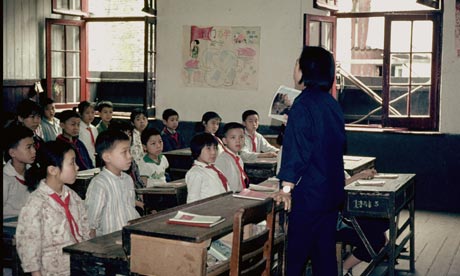China recruits classroom
snoops to fight
violence and pornography
Experts warn of harm to pupils as police and education officials in Yunnan call for 'little security informants' in primary and middle schools to stop anti-social behaviour

Authorities in Yunnan wants to recruit classroom snoops to thwart violence and anti-social behaviour inside and outside primary and secondary schools. Photograph: Cornelis Verwaal/Time & Life Pictures/Getty Images
Police and education officials have ordered teachers to appoint pupils as "little security informants" in a south-western Chinese city amid concerns about school violence, a state-owned newspaper reported.
Class tutors at primary and middle schools should pick two or three students to collect information on everything from the spread of pornography to bad behaviour by youths in the area, authorities in Kunming, Yunnan province, have said.
Newspapers and scholars have condemned the plan as unreasonable and warned it could harm those selected as informants.
Legal Daily said Kunming's police and education departments had released a notice on "preventing and tackling campus violence" which also says that students who organise other students for affray or to disturb security will be sent to reform school for 10 to 15 days of legal education.
It says the "little security informants" should not only collect information on physical attacks but also extortion by older pupils, the spread of pornography via mobile phones, misbehaviour by youths close to schools and students in urgent need of help from their schools or police.
Teachers should pass this information to the education department.
Earlier this year a headmaster and an education official were dismissed after 11 boys at a city school beat up a female student and spread a video of the attack from phone to phone using Bluetooth.
Yan Jiming, director of the Ciba police station, told a newspaper it was important to tackle violence in schools. He said that three-fifths of the 485 reports of fighting received by the police station involved pupils.
However, an editorial in the Beijing News warned: "Asking students from elementary as well as middle school to be informants is neither reasonable nor legal.
"When crime or campus violence takes place, students should call the police, but it does not mean they should report to police on a regular basis."
Professor Yang from Yunnan Normal University told the Legal Daily that children in elementary and middle schools – who range in age from seven to 17 – are neither physically nor mentally mature.
"Developing informants who collect negative information about their classmates will create suspicion among students and also do harm to the students who are informants.
"It's very hard to imagine how an immature kid can grow healthily while collecting negative information on his or her fellows."
Ma Laoding, a lawyer from Yunnan, warned: "Once [the informants'] identities are discovered by others, they will not only be isolated, but their safety will be at risk."
Education officials were unavailable for comment.
A Kunming police spokesman, who gave his name only as Mr Li, said the measure was intended to protect students.
"Little security informants are mainly to let the teachers know about potential dangers and situations like extortion, to keep a safe environment for all students," he said.
"The Legal Daily's journalist said they are undercover agents which is not right. We never said [that]. Undercover agents are police who work undercover to investigate crime and are totally different from little security informants."

Nenhum comentário:
Postar um comentário